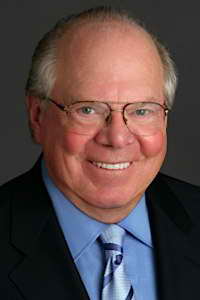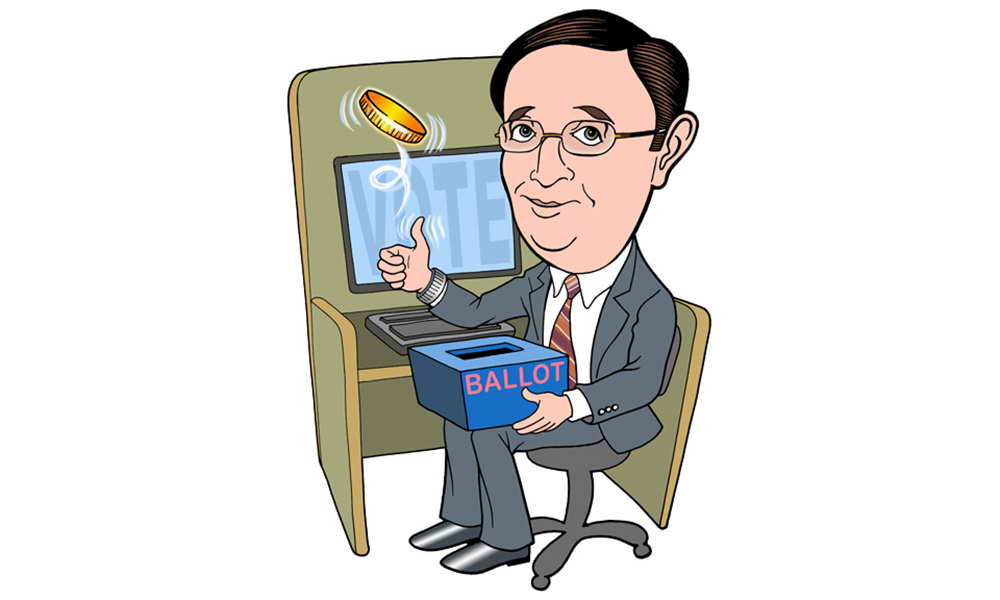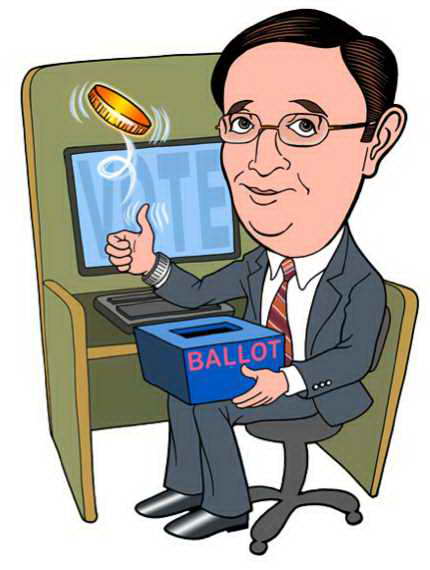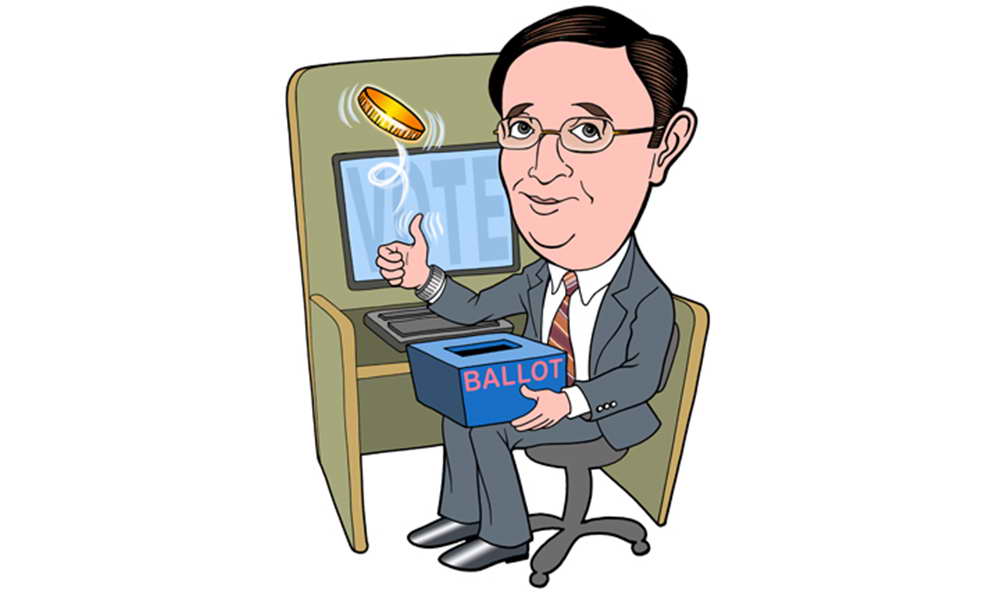By John Sparks
Will the GOP retake the House? Will the Senate be gridlocked? And, what are the lasting effects of Tuesday’s midterm elections? The Marist Poll’s John Sparks speaks with Marist Poll Analyst and syndicated political columnist Carl Leubsdorf who writes a weekly column for The Dallas Morning News.

Carl Leubsdorf
John Sparks
Carl, we’re right on top of the midterm elections. I read an estimate that said in the House, about 168 seats are solidly Republican, 155 solidly Democrat, about 112 seats in play. Do you think that the Republicans have a chance to retake the House?
Carl Leubsdorf
Oh, I think most people think that the Republicans are going to retake the House, and the only real question is by how much they take it. All signs are, and I’ve been just looking at a lot of polls of House Democratic incumbents, and there’s so many districts in which the Democratic incumbents are polling in the low 40’s, some that are ahead by a couple of points, some that are behind by a couple of points. An an incumbent who’s in his low 40’s at this time, two weeks out from the election, is in very deep trouble, and undecided vote is unlikely to go with the incumbent. So if the national polling on intent and Congressional elections is anywhere close to correct and you’re seeing those have anywhere from a five to a 10-point Republican lead, the Republicans are going to gain between 50 and 60 seats, and they need to get 39 to take the House.
John Sparks
You know, we’ve both seen polls that indicate that voters are angry. They say, “Throw the bums out regardless of the party.” They want change which is kind of ironic since President Obama campaigned on change just two short years ago. But, do you really think that incumbents are in trouble?
Carl Leubsdorf
Oh yeah, I think they are, but they’re mostly Democratic incumbents who are in trouble. One reason for that is there are many more Democrats who represent swing districts. As a result of the 2006 and the 2008 elections, the Republican representation in the House was reduced substantially, and most of those districts are pretty safe Republican districts, but, for example, you have 48 or 49 Democrats who represent House districts that John McCain carried in the presidential election. That kind of a district can go either way and has in different years, so the Democrats have to defend an awful lot plus, they’ve been running the government for the last two years, so they’re the — any anti-incumbent wave is going to strike them and inordinately high.
John Sparks
Do you think that we could wake up on November 3rd to see a repeat of say, what we saw in 1994 with the Contract with America when the Republicans won in droves?
Carl Leubsdorf
Well, the Republican… The difference between this and 1994 is that in 1994 most of us thought that the Republicans would win the Senate, which they did, and we had that pretty much pegged because there were so many open Democratic seats in the Senate. But in the House, most of us were quite surprised by the Republican landslide in the House. It broke very late. A lot of Democrats were quite unprepared for what happened. There’s no surprise this time. For the last year or more than a year, some analysts have been saying that the Democratic hold on the House is in trouble, that many Democratic freshmen and sophomores in districts that are not particularly Democratic would have a tough time. So, we won’t be surprised at all. I mean, we’ll be surprised by two things. We’ll be surprised if the Democrats keep the House, and we’ll surprised — be surprised if the Republicans win a majority, win 70 or 80 Democratic seats as opposed to more like 50.
John Sparks
Let’s take a look over at the Senate side of things. What do you think is going to happen?
Carl Leubsdorf
Well, that’s interesting because it looks at this point like the Democrats have a pretty good shot of holding the Senate. Now some analysts have pointed out that there has been no election in modern time where the House has switched parties where the Senate has not switched parties, and yet it looks at this point like the Republicans are likely to fall a seat or two short in the Senate. Not only that, but a couple of races where the Republicans have had fairly comfortable leads, the polling shows they’ve tightened up a lot. For example, in Pennsylvania where Arlen Specter, the incumbent, was beaten in the Democratic primary by Joe Sestak, a congressman. Ever since then, the polls have showed that Pat Toomey, the conservative Republican challenger, has been ahead of Sestak by anywhere from 7 to 10 points. In the last two or three days, we’ve had a couple of polls showing Sestak pulling ahead by 3 points. In the primary, he came on very late, and it’s always possible that that will happen here again, and what makes the polls somewhat credible is they continue to show a comfortable Republican lead in the governor’s race there. So we’ve seen that there. We even saw a poll in Wisconsin where, I think, most many Democrats gave Senator Russ Feingold up for as a loser this year, that someone came out with a poll this week that showed him a couple of points ahead. So, we’ve got half a dozen at least very close Senate races, and there is some history that in a wave election where there’s a big swing to one party, all of those close races go one direction, and that’s certainly possible that at the end all these close Senate races will go Republican along with the House, and the Republicans will win the Senate. One other thing about the Senate, whichever party wins the numerical majority in the Senate, whether it’s 50/51/52 seats, it’s going to be a very small majority, and given the fact that the Senate has decided you need 60 votes to do almost anything, the Senate is certainly headed for gridlock city.
John Sparks
Carl, you know we’ve been talking about the immediate election, but there are some down ballot races, state results that are going to have an impact on the makeup of the Congress, and I talk about redistricting.
Carl Leubsdorf
I think there is a real danger for the Democrats of what I call a double whammy in this election that not only will they lose the House and possibly the Senate, but certainly a lot of their Senate seats, but that what’s happened in some of those down ballot races, especially legislative and gubernatorial races, will set the Democrats up for another defeat in two years, and let me explain what I mean. As you know, every 10 years, legislative and congressional seats are — the boundaries are redrawn according to population changes. Some states gain Congressional seats, some lose Congressional seats, and in other cases, the population is shifted within the state, so the boundaries get redrawn. And, it looks like that because this is going to be such a Republican election, and that’s going to carry through into state legislative races, that the Republicans will have a real advantage in redrawing the district lines. For example, in Texas, which will probably gain four seats, and Florida, which will be probably gain two seats, the Republicans will probably control the legislature in both. Probably win the governorship in Texas. Florida is closer. They might not win there. But a couple of Northern states like Michigan and Ohio, which are losing seats in Congress, the Republicans are doing well there, too. So, if they redraw the lines in these states to favor the Republicans, it could make it that much harder for the Democrats to rebound in two years, even if the economy improves and President Obama gets re-elected. There’s another factor in this. The Senate seats, of course, come up every six years, and the Senate seats that are going to be up for election in 2012 are the ones that were elected in 2006. Well, 2006 was a big Democratic year so as a result of the 33 Senate seats up next time, only 10 are Republican seats, and most of them are pretty safe. So this is why Republican leaders are talking about, even if they don’t win the Senate this time, they think they can win it next time. And, if it’ll rebound, then the House would be very difficult for the Democrats. So, they may be in the minority for more than two years here.
John Sparks
You know, the president and first lady are traveling now stumping on behalf of Democratic candidates. Former President Clinton has been out on the campaign trail too I understand. What will it be like for the president and the — his administration with Republican control of the Congress? What can we look for in the way of running the government for the next two years?
Carl Leubsdorf
Of course, the president will continue to run the government in terms of the executive branch, and it’s going to be very difficult for the Republicans, even if they win the House and even if they get a small majority in the Senate to be able to follow through on some of their promises to basically stop what Obama has done and, for example, repeal and replace major parts of the health reform bill. The president will still have the veto. He certainly will be using it, and that requires a two-thirds vote in either — in both houses to override him, and that will be very difficult. For example, if the Republicans try to deny funding to carry out the health bill when the appropriation bill is up for the Department of Health and Human Services, the result of that will be that it’ll be very hard to pass an appropriations bill for those departments. Even if they get it through both houses, again, the President will be in a position to block it, so I think there’s going to be a lot of — they’re going to be at each other’s throats a lot, and unless they can find some areas to do some cooperating, you’re not going to see much of that. Now, the other thing that will happen with a Republican Congress and especially Republican House is, we’ve seen this before, that when the other branch has the control of the Congress, they have control of the committees, and they can conduct investigations. And Darrell Issa of California, Republican congressman who’s due to the head the committee that the government — used to call it Government Operations Committee, has already said that he’s going to hire a lot of FBI agents, and he’s going to conduct a whole series of investigations of the way the Obama administration has done its business. So, the administration, if that happens, can expect to have its top officials spending a lot of time testifying on Capitol Hill as the Republicans try to poke holes in its record in advance of the presidential election. So, the administration will have to do the best it can with this. It’s not a unique situation obviously. President Clinton faced it after the 1994 election. He really stood tough on budget issues, but — and in the end forced a confrontation which rebounded in his favor. So, I think we’re in for a lot of acrimony and not much cooperation.
John Sparks
When I think back about a Democratic president losing popularity, I think back to Jimmy Carter and the scenario that we were in prior to the election of 1980 where we had a Democratic president who was slipping, who was hurt. He was stymied by the Iran hostage crisis, but at that time the Republicans had Ronald Reagan who came in waiting in the wings and took the election of 1980. When I think about our present times, I see Obama losing the confidence of the American people, but I see the Republican Party this time in much of a disarray. Would you agree?
Carl Leubsdorf
Well, I think two things to that. First is for all the talk about how badly Obama’s doing and all of his problems, his job approval isn’t that bad. There was a new poll today, I think he was — his job approval was 47%. It’s never gone below the low 40’s, and it sort of stabilized in the mid to upper 40’s, so it’s not like he’s in the high 20’s, which is where former President Bush ended up, and Carter ended up pretty low too at the end. So that’s one thing. He’s not as unpopular as people think, and the electorate and presidential elections is very different from Congressional elections. Young people vote more. Minorities vote more, and things that help the — those help the Democrats.
As for the disarray in the Republican Party, the Tea Party wing of the Republican Party, and I mean that’s really what it is, it’s the right side of the Republican Party, is really feeling its oats after having won a bunch of primary fights with establishment Republicans. Now, ironically some of those primary fights may be the reason that the Republicans don’t win the Senate, that there are a couple of Senate seats that they probably would’ve won with the establishment candidates and might not win with the Tea Party candidates. But in any case, it’s clear that the Tea Party group has a lot of support in the Republican rank and file, and you can see a really bitter fight developing for the Republican presidential nomination in which one or another or several candidates backed by various Tea Party groups and bowing to really shake up the Republican Party take on the more established wing. For example, if former Governor Sarah Palin of Alaska runs against — as a Tea Party candidate against Mitt Romney, the former Governor of Massachusetts, who’s more of the establishment type, you can see a really divisive primary fight and possibly the nomination of someone who’s not electable. I mean, we’ve seen that before. The Republicans nominated Barry Goldwater in 1964. He was not electable and lost to President Johnson. The Democrats nominated George McGovern in 1972. He was not electable. In both cases, they would more acted the swing of the party forced the nomination on the establishment wing, and they took a licking in the election. So, so much is going to depend on the economy and how things go in the next couple of years. If unemployment is still near 10% in the spring of 2012, President Obama is going to be in trouble no matter who the opponent is, but if unemployment drops to say the 8% level, which these days would look pretty good, and put people in much more optimistic about the trend, it’s going to be much harder for the Republicans. Elected presidents tend to get re-elected in this country. Jimmy Carter did not, and he was — that was an unusual situation. He had regained the White House for his party in the 1976 election and lost four years later. The other incumbents who’ve been beaten were President Bush who was beaten in 1992, but that was the third Republican term after the two Reagan terms, and same thing is true many years ago President Hoover in 1932. So someone who brought his party back in to then lose in four years, that would be unusual, but of course, nothing’s impossible in politics.
John Sparks
Carl, the mention of acrimony a moment ago certainly resonated with me. I am very concerned about that. It seems like to me that the bitterness has been responsible for the lack of productivity on the Hilltop, and now we see polls where voters are angry…throw the bums out… what in the world would it take to get folks on both sides of the aisle to work together, to have logrolling, to do deals, to live to fight another day?
Carl Leubsdorf
Well, you know logrolling has been made a dirty word, too. It’s one of the problems. We used to say, and that it would be good if the parties, if the all liberals were on one side and all the conservatives were on the other side. I’ve just been reading a book about the 1938 Congressional election where President Roosevelt tried to defeat several conservative senators in the Democratic Party so that the Democratic Party would more reflect his liberal progressive point of view. And what’s happened is that with one party — instead of two parties that are coalitions where there’s sort of a natural effort in the middle to work together, we have one on one side and one on the other, and it’s not only personal acrimony, they — there’re two things. They act… They really disagree with each other on the approaches. You see that in this debate about taxes where the Democrats want to increase the taxes on those over a certain income level, and the Republicans don’t. You see it on the role of the government in the stimulus bill that has become such a controversial issue. That was one of the first things that passed after President Obama came in. By all independent analyses, the stimulus bill really saved the economy from going off the cliff even worse than it was. It saved about 3 million jobs, and it got some things going that really were helpful to the economy. But, all you hear from the opponents of Obama and most of the Republicans saying that they wasted $800 billion. Well, no… independent analysts don’t think it was wasted. The bank bailout, the bank bailouts have had a terrible press, but the fact is that they stabilized the banking system. So, it seems like as soon as one side gets in, the other side is determined to prove what a bunch of failures there are. You would’ve thought with a big economic crisis two years ago and Obama having won by a fairly considerable majority, that there was a basis for the parties cooperating more, but that didn’t happen, and I’m not sure now what it would take to have that happen.
John Sparks
Anything you’d like to add before we call it a day?
Carl Leubsdorf
No, I mean I think one thing that’ll happen of course is there always are some surprises on Election Day. Some people we thought we were going to lose are going to win. Some people who were going to win going to lose. But, I think everyone in the political world would be shocked if, for example, the Democrats retained control of the House of Representatives, or something like that happened or if some of the candidates on the Republican side, like you know, some of the more conservative candidates if they won, but some of them probably are going to win, and it’s going to be interesting to see how the Republicans deal with that. But, there will be some surprises. Something will happen that we didn’t expect. But, with — modern polling has gotten very sophisticated. There’s an awful lot of it being done. There is a lot of comparing of apples and oranges in different polls, but the polls this time are so consistent and so uniform both on the district and state level and on national level, that it’s hard to see the major result of the election being a surprise.
 As the hours ticked down to 2011, I questioned my decision. “There are definitely plenty of bad habits and personality flaws that I can work on correcting,” I thought. So, my ultimate decision was to resolve to worry less and enjoy life more. (No small task for the ultimate Little Miss Worry Wart.)
As the hours ticked down to 2011, I questioned my decision. “There are definitely plenty of bad habits and personality flaws that I can work on correcting,” I thought. So, my ultimate decision was to resolve to worry less and enjoy life more. (No small task for the ultimate Little Miss Worry Wart.)













